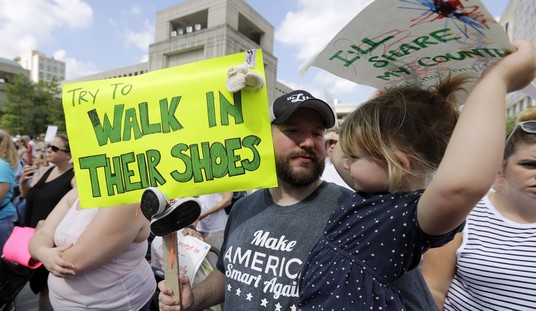To help while away the time while whittling away the calories, I generally listen to something while wheeling along the treadmill. One current favorite is the long-running English discussion program “In Our Time” with Melvyn Bragg. Yesterday, I happened to puff away to a discussion of Magna Carta, the great foundational document of democracy that the barons imposed upon the evil King John (remember the Sheriff of Nottingham? Sir Guy of Gisbourne?) at Runnymede in 1215. (The operative bits date mostly from the charter of 1225, but 1215 is the date impressed upon our school memories.)
Bragg began his show by quoting one of the most famous sections of the Great Charter, clause 39: “No free man shall be seized or imprisoned, or stripped of his rights or possessions, or outlawed or exiled, or deprived of his standing in any other way, nor will we proceed with force against him, or send others to do so, except by the lawful judgment of his equals or by the law of the land.”
Here for once the “emanations and penumbras” that William O. Douglas discerned some centuries later really do cast their reverberations. For what these few lines limn is what we now call the right of due process, with hints about a presumption of innocence, habeas corpus, and a good deal more of the machinery of modern civil rights.
Above all, however, Magna Carta revolves around two checks on tyranny, outlining the protections individuals enjoy against the arbitrary coercive power of the state and, just as important, declaring the subjection of the sovereign to the law of the land.
Magna Carta has been an immensely influential document, not least on the framers of the U.S. Constitution. Whole books have undoubtedly been written on this subject, but listening to Melvyn Bragg and his guests yesterday, I thought especially of this bit from Article II of the Constitution: “I do solemnly swear (or affirm) that I will faithfully execute the Office of President of the United States, and will to the best of my Ability, preserve, protect and defend the Constitution of the United States.” The Constitution is the founding document of the law of this land, the United States of America, and the framers empowered the president to “preserve, protect and defend” the Constitution in discharging his obligation to faithfully execute the Office of the President.
How are we doing on that score? Yesterday, even as I was puffing away, Senator Ted Cruz released a list of 76 examples of Barack Obama’s lawlessness, from implementing portions of the DREAM Act, which Congress rejected, by executive action (#2) to ordering, by executive fiat, various extensions, waivers, exemptions, and delays of Obamacare.
I have no doubt that Senator Cruz’s document will be regarded as an example of partisan gamesmanship by the Left, but it is difficult to read through that long list of actions without wondering whether something serious has happened to the presidency—whether, in short, the checks and balances envisioned by the founders have failed and that the chief executive, who was supposed to be subservient to the laws passed by Congress, has not in fact emerged as the originator, not the executor, of laws.
This is the central theme of a forthcoming book by the former prosecutor Andrew C. McCarthy. It’s called Faithless Execution: Building the Political Case for Obama’s Impeachment. You will, I suspect, be hearing a lot about this book. It won’t be officially published until June 3, but you can beat the rush by pre-ordering it now here.









Join the conversation as a VIP Member